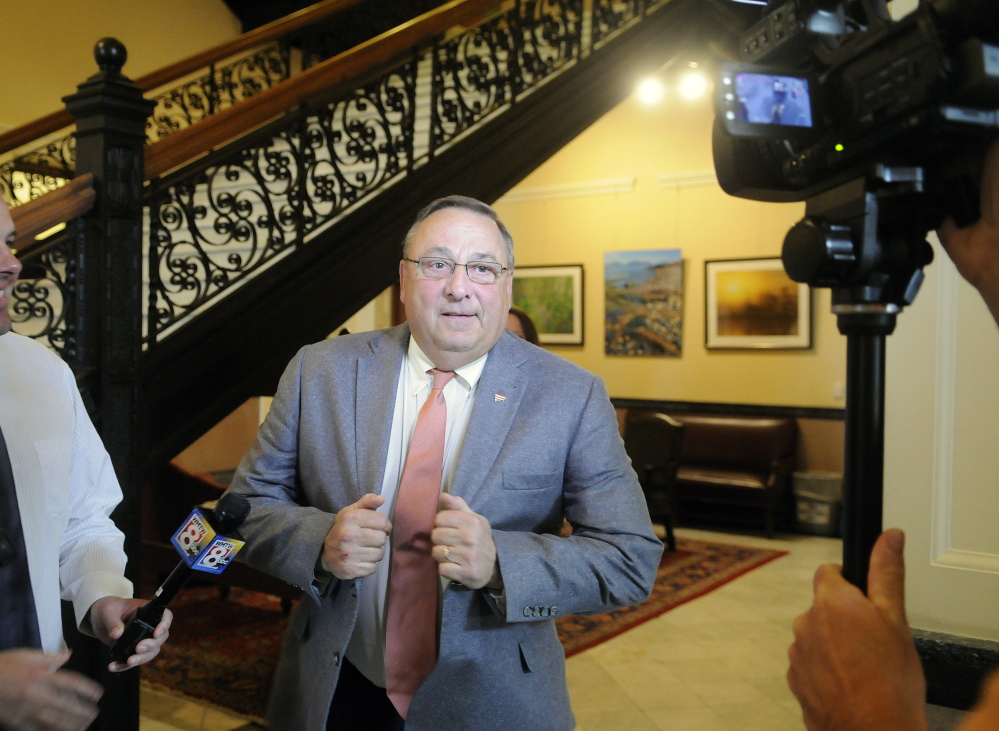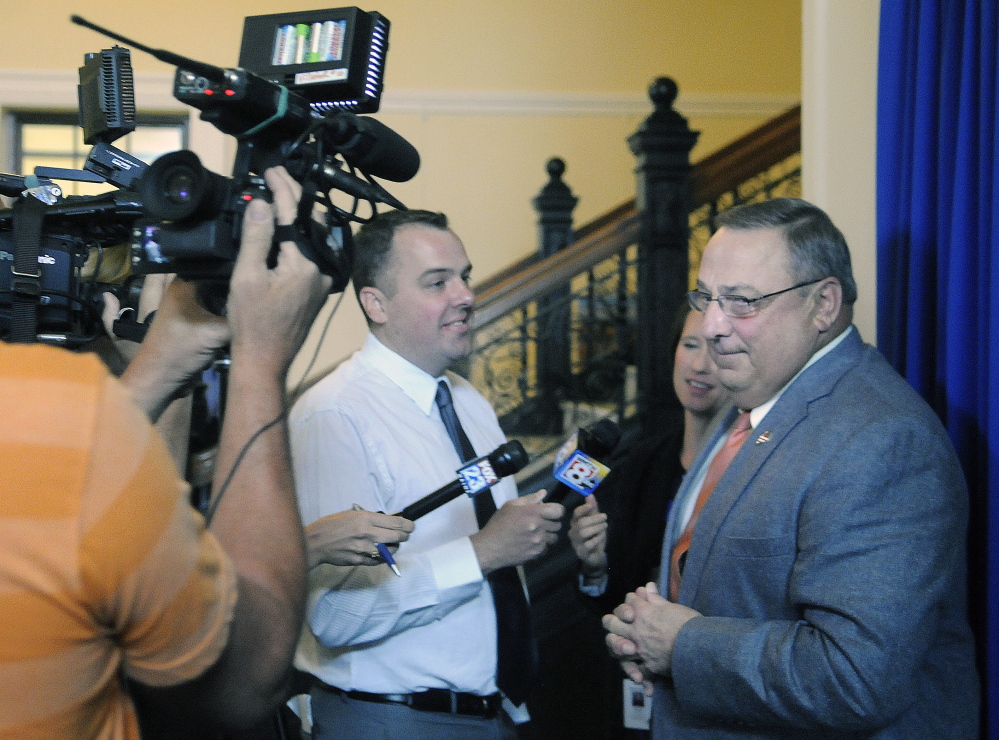AUGUSTA — An unusually combative legislative session took another unexpected turn Wednesday when Gov. Paul LePage and Democratic leaders clashed over whether 19 bills became law because the governor failed to veto them within the 10-day veto window.
Lawmakers maintain the bills – ranging from contentious welfare issues to noncontroversial measures on broadband Internet – are now law. Yet LePage, citing his own legal analysis of the Maine Constitution, says lawmakers’ use of the word “adjourn” last week rather than “recess” gave him additional time to hold the bills.
Meanwhile, the nonpartisan state office responsible for publishing Maine statutes began writing the 19 bills into law on Wednesday despite the governor’s interpretation. Republican leaders were conspicuously silent on the issue, which could be headed to Maine’s highest court.
Democrats are confident the governor missed his veto window.
“The Constitution and historical precedent make clear that these bills are law,” House Speaker Mark Eves, D-North Berwick, said in a statement. “The governor is wrong.”
And this is no mere matter of semantics.
The outcome of the debate could have major implications for Portland City Hall, users of electronic cigarettes and pregnant women held in Maine prisons. For instance, LePage’s failure to veto one bill he vehemently opposed would allow asylum seekers to receive General Assistance for up to two years if his position is not upheld.
The governor already has achieved his stated goal of drawing out the legislative session by vetoing well over 100 bills and counting. His latest move, if successful, could require lawmakers to meet for additional days and force supporters of the bills to muster two-thirds majorities in both the House and Senate to override a late veto from the governor.
In the case of the General Assistance bill, L.D. 369, it appears unlikely supporters would win two-thirds support.
Portland City Councilor Jon Hinck, a former Democratic lawmaker and vocal LePage critic, said he found it “enormously amusing” that the governor may have inadvertently allowed a bill he stridently opposed to become law, calling it an act of “accidental compassion.”
“Maybe we have to stumble onto the right course,” Hinck said, referring to state-level politics. “Maybe that’s what happened here.”
LePage’s maneuver, which is further fraying already tattered relations with some legislative leaders, appears to hinge on the question of whether the Legislature “adjourned” last week or “recessed.”
Under Maine’s Constitution, the governor has 10 days – excluding Sundays – to either sign or veto a bill passed by the Legislature. If he fails to act by the end of that 10-day period, the bill becomes law without the governor’s signature.
THE MEANING OF ‘ADJOURN’
The issue gets tricky, however, when the Legislature adjourns and reconvenes. The state constitution states that the governor has three days to send down a veto after lawmakers reconvene. Legislative leaders insist that they did not adjourn on June 30 but “recessed” until July 16 in order to take up a slew of vetoes expected to come from the governor.
But LePage’s office is pointing to an order passed by the Legislature on June 30 that states the Legislature will “Adjourn until the call of the Speaker and President.”
“As allowed by the Maine Constitution, the governor will submit the vetoes when the Legislature meets again for three days,” LePage spokeswoman Adrienne Bennett said in an email to reporters. “It has been a contentious session, and many in the Legislature claimed they did not have time to deal with the vetoes. The Legislature can choose to meet for at least three days now, or they can wait until they come back in January. Either way, they will have ample time to thoughtfully consider these vetoes, rather than rushing through them in another veto-override spree without understanding what they are voting on.”
In other words, LePage could wait until the Legislature has met for three days before he sends the vetoed bills to the House and Senate chambers for reconsideration.
The Clerk of the Maine House, Robert Hunt, said the two chambers use the word “adjourn” in the context of a temporary recess and routinely pass “adjournment orders” – similar to the one adopted on June 30 – when lawmakers leave town for several days. In fact, the House ends each legislative work day by saying that “the House stands adjourned” until the specified return date.
“We have adjourned multiple times and multiple times there have been vetoes presented to us that we have considered. So what has changed?” Hunt said. “It’s my interpretation that the 10 days have lapsed on these (bills) and we are still in session.”
Hunt also referred to an authoritative text on statutes, the American Bar Association publication called “Sutherland Statutes and Statutory Construction.”
“The term ‘adjournment’ as used in the constitutional provisions is generally held to relate to final adjournment rather than temporary adjournment or recess,” reads the publication. “Thus, a return of a bill after a temporary recess does not prevent the bill from becoming law.”
LEPAGE: ‘I VETOED THE BILLS’
The 19 bills in question run the gamut. One, L.D. 1108, would prohibit the use of electronic cigarettes, or e-cigarettes, in restaurants, on beaches and in other public places were smoking is already banned. Another bill, L.D. 1013, sets additional restrictions on the use of restraints, such as handcuffs or leg shackles, on pregnant prisoners.
L.D. 113 reduces the punishment for possession of some drugs when the violator has no previous convictions. As the use of unmanned drones by both the police and the public becomes more popular, L.D. 25 would require law enforcement agencies to obtain a warrant before using a drone for criminal investigations except in prescribed circumstances.
LePage’s maneuver is consistent with his vows to keep lawmakers busy with his veto pen in response to lawmakers’ refusal to adopt key portions of his budget or allow a constitutional amendment vote on eliminating the income tax.
“For five months they wasted our time. This time I am going to waste a little bit of their time,” LePage said on June 17.
In a brief interview with reporters Wednesday, LePage said he was not “pocket vetoing” the bills, but merely following the state constitution’s requirements that he wait until the Legislature reconvenes to return the bills to lawmakers.
“I vetoed the bills,” LePage told reporters Wednesday, according to the Maine Public Broadcasting Network. “They’re all vetoed. They need to be here for four days before (lawmakers) can act on them.”
Asked what he will do if the Legislature insists that the bills are already law, LePage said he will “try to force them.”
“We’ll go to the courts and we’ll ask them,” LePage said. “It’s in the Constitution … It’s very clear – very, very clear. Even I can understand it and I’m French.”
Despite the governor’s position, the Revisor of Statutes – the nonpartisan legislative office that drafts bills and writes statutory language – began writing the 19 bills into law on Wednesday, although most will not take effect for 90 days. The office’s director, Suzanne Gresser, said it was business as usual for her staff.
“The governor’s office has not contacted us or asked us to do anything differently than what we have been doing, nor has any legislative office,” Gresser said.
DEMOCRATS ASSUME BILLS ARE LAW
Spokesmen for the House and Senate Republican leadership said they were reviewing the situation and declined to comment. Democratic leaders, meanwhile, were pushing ahead as if the 19 bills had become law without the governor’s signature and were urging legislative staff to begin turning the bills into statutes.
LePage could ask the Maine Supreme Judicial Court to weigh in on the adjournment issue, although the court is not obligated to consider the petition.
Paul Mills, a Maine political historian and the brother of Democratic Attorney General Janet Mills, told The Associated Press that he wouldn’t be surprised if the Maine Supreme Court is asked to weigh in on the issue, as it has in the past on similar procedural debates in the Legislature.
One opinion of the justices in 1981 may play into LePage’s favor. In that ruling, the justices argued that the Constitution requires that “the same Legislature must continuously be in session for three days before the period in which the governor may act on the pending bill expires.”
The governor’s failure to veto the bills – whether unintentionally or because of his interpretation of “adjournment” – angered some members of his party and was viewed by others as another example of how the two-term governor is burning bridges with lawmakers.
“It’s really kind of unexplainable,” said Lance Dutson, a longtime Republican strategist and consultant who has been a vocal critic of LePage’s recent actions. “I can’t imagine that this is anything but a major screw-up on the part of the administration. And their explanation today is absurd.”
Dutson said the governor has increasingly alienated himself from Republicans by “instituting a culture of fear and retribution.”
Staff Writers Eric Russell and Randy Billings contributed to this report.
Send questions/comments to the editors.









Success. Please wait for the page to reload. If the page does not reload within 5 seconds, please refresh the page.
Enter your email and password to access comments.
Hi, to comment on stories you must . This profile is in addition to your subscription and website login.
Already have a commenting profile? .
Invalid username/password.
Please check your email to confirm and complete your registration.
Only subscribers are eligible to post comments. Please subscribe or login first for digital access. Here’s why.
Use the form below to reset your password. When you've submitted your account email, we will send an email with a reset code.